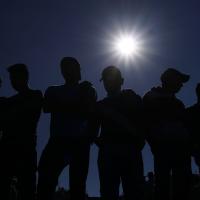PATHWAYS - Complex Pathways of Climate Mobility for Children and Youth in Ethiopia
PATHWAYS focuses on how children and youth cope with climate stressors in Ethiopia, where extreme climate events and slow onset changes continuously aggravate existing socio-economic conditions.
Through collaborative research, we explore how young people perceive their own vulnerability, available protection mechanisms, and resulting mobility outcomes.
Relevance of the project
PATHWAYS' focus is to debunk simplistic assumptions about climate change-related migration by studying mobility patterns of children and youth of different genders. Starting in June 2023, and for the next four years, PATHWAYS will investigate diverse mobility or immobility practices employed by children and youth in Ethiopia in response to the worsening environmental conditions. Our research will listen to children’s and young people’s voices, talking about and engaging with climate change. We will attempt to understand what established migration traditions mean for their aspirations for the future and discern whether and how climate-change-directed development initiatives shape and influence their mobility within the country and beyond.
The project’s background
Recent research has begun to explore young people’s interlinked experiences of climate change and mobility, recognizing that youth are not only highly vulnerable to the impacts of climate stressors but also pivotal actors in their own lives and societal transformation. Education, social networks, and access to information are vital in shaping their mobility aspirations and perceptions of climate change.
Ethiopia serves as an exemplary case for investigating the interplay between youth, climate change and mobility due to the existing detrimental effects of climate change, a growing youth population and substantial projected young mobility rates, with 70% of the country's migration involving young people aged between 16 and 24.
Despite a growing body of research on the topics, significant gaps remain in our understanding of how climate change and mobility interact across different age groups and genders and how existing climate change adaptation strategies consider young people’s mobility practices. The PATHWAYS project aims to fill these gaps through a multidisciplinary research strategy, bridging development, migration, climate, and youth studies. The research is grounded in a human security framework, which recognizes the critical agency of young people within socio-ecological contexts and relations.
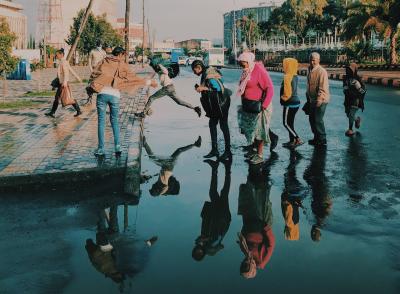
The aims
PATHWAYS aims to understand how climate stressors and social protection systems affect the mobility aspirations and capabilities of children and youth. This will advance scholarly understanding and help policymakers address adaptation and social protection frameworks related to climate change in the future.
Our research objectives:
- To understand how children and youth perceive and respond to climate change and its gendered impacts.
- To generate empirical evidence on the influence of climate change on mobility patterns.
- To evaluate current and potential policies for climate change adaptation to guide future policy development.
Capacity building objectives:
- To encourage climate change and mobility research collaboration and PhD education at Addis Ababa University (AAU).
- To advance knowledge-based South-South cooperation by partnering with the Organization for Social Science Research in Eastern and Southern Africa (OSSREA).
- To empower children and youth organizations to actively address climate-related risks, strengthening their role in adaptation efforts through collaboration with Save the Children (SC).
Funding, timeframe, and partners
The project is funded by the Danish International Development Agency (DANIDA) and Denmark’s Consultative Research Committee for Development Research (FFU), and it runs from June 1st, 2023, to May 31st, 2027.
PATHWAYS is a multidisciplinary endeavour conducted jointly by researchers based at the Danish Institute for International Studies (DIIS), Addis Ababa University (AAU), and the Organization for Social Science Research in Eastern and Southern Africa (OSSREA). Additional expertise is drawn in from Lund University, Sweden and Tufts University, USA, as well as from Save the Children. Ninna Nyberg Sørensen (DIIS) and Tekalign Ayalew Mengiste (AAU) jointly coordinate the project.
Programme
PATHWAYS aims to strengthen research and policy capacities for all participants- DIIS, OSSREA and SC- while enhancing research-based education at AAU. We will carry out collaborative fieldwork and jointly write resulting empirical findings to be disseminated to academic and policy-practice audiences through publications, presentations, webinars, policy briefs, media engagement, and regular meetings with stakeholders. Among envisaged outputs is an exhibition co-created with children and youth to disseminate knowledge on climate-related vulnerabilities and adaptation strategies to be shown at schools in the research areas in Ethiopia.
Sign up for the DIIS newsletter to stay updated with the latest developments and important information about the project.
Ninna Nyberg Sørensen: Senior Researcher at DIIS, a migration-development-conflict expert with extensive managerial and field experience.
Tekalign Ayalew Mengiste: Associate Professor and chair of SOAN, University of Addis Ababa, with extensive experience in regional mobility forms and patterns.
Truphena Mukuna: Executive Director of OSSREA and specialist in gender, youth, and child protection.
Ida Marie Savio Vammen: Senior Researcher at DIIS, expert on the effects of soft migration governance in Africa and migrant aspirations.
Yeshtila Wondemeneh Bekele: Assistant Professor in Political Economy and Development, University of Addis Ababa, founder of the Governance and Development Studies School at AAU.
Mo Hamza: Professor at Lund University, expert on climate change, disasters and displacement and with vast experience in capacity building.
Aklilu Amsalu: Associate Professor at the College of Social Sciences, University of Addis Ababa, climate change mitigation, adaptation and financing specialist.
Kimberly Howe: Assistant Professor at Tufts University, expert on the effects of humanitarian and political interventions on civilians, armed groups and political structures and on developing child-sensitive methodological tools.
George Neville: Trends and Research Advisor at Save the Children Denmark, expert in conducting applied research with vulnerable populations.
Temesgen Chibssa Etana: PhD student at the University of Addis Ababa.
Abera Ogato Onchere: PhD student at the University of Addis Ababa.
Fiker Haile Melekot: PhD student at the University of Addis Ababa.
Capacity development, PhD training March 13, 2024
PATHWAYS offered a full day training seminar on Climate change and migration dynamics for PhD students at Addis Ababa University. The seminar was hosted by OSSREA, attended by 14 PhD students from various departments across the University, and jointly organized by Professor Aklilu Amsalu, Center for Development Studies at Addis Ababa University and Professor Mo Hamza, Division of Risk management and Societal Safety, Lund University.
Advancing Sustainable Child and Youth Mobility in the Face of Climate Change, March 12, 2024
In collaboration with Save the Children Ethiopia, PATHWAYS hosted a stakeholder workshop and participatory work lab at Hotel Best Western Pearl, Addis Ababa. The workshop was attended by 30 representatives of Central and Local Government, Woreda representatives from the study sites, International and National Organisations, Ethiopian academics and the Danish Embassy.
PATHWAYS Yearly Workshop Addis Ababa, March 9-11, 2024
The entire team met three days in Addis Ababa to discuss and finalize the field site scoping studies; a comprehensive literature review concerning past and present Ethiopian vulnerabilities, social protection mechanisms and mobility patterns; a comprehensive stakeholder mapping study; as well the methodological tools to be applied in upcoming field work. Special emphasis was put on Child and Youth sensitive methodologies, including practical training of the entire team.
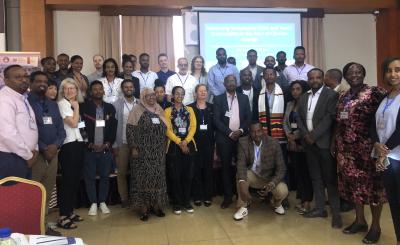
Additional field site selection, December 2023
In consultation with Save the Children Ethiopia, it has been decided to include the Somali region in PATHWAYS. Mobility in the region is high, knowledge on the nexus between climate change, food insecurity, conflict and youth migration is scarce. In the latter half of December, 2023, the Ethiopia team made a field visit to the Somali region and conducted interviews with regional stakeholders. Based on consultation with these, it was decided to select Kebri Beyah Woreda in the Fafan Zone for further field studies. A field report covering the woreda profile, an assessment of environmental change and vulnerability, as well as a mapping of mobility patterns and existing social protection mechanisms, were subsequently produced.
Field site selection
In the last half of September, 2023, the Ethiopia team, including the PhD students, carried out preliminary field work to select three field sites for the PAWTHWAYS project. The objective was to undertake a site analysis of the local context, select appropriate kebeles from each study site for further research, introduce local officials and relevant stakeholders to the PATHWAYS research, and introduce the PhD students to the area to facilitate their further activities. Based on The field visit resulted in the selection of Chencha Woreda in the Gamo Zone, and Dugena Fango Woreda in the Wolaita Zone. In the latter, two kebeles (Anka Damota and Fango Bijo) were selected. The visit resulted in a field report covering the profile of each study site, an assessment of environmental change and vulnerability, and a mapping of mobility patterns and available social protection mechanisms.
Capacity development
October 13-16, 2023, PhD students and OSSREA administrative staff met in Addis Ababa for two parallel events: 1. A PhD course focusing on climate mobility theory, methodology and gender analysis; and 2. A training course directed at budgeting, accounting, and project reporting. During the PhD course students presented their revised proposals and discussed ways to work in mobility considerations beyond the movement of people, including attendance to gender intersectionality and age specificity, the latter geared at future field work among children and young people. The PhD course was run by Dr. Truphena Makuna and senior researcher Ninna Nyberg Sørensen; the financial training course by Ninna Nyberg Sørensen and senior controller Annette Holm.
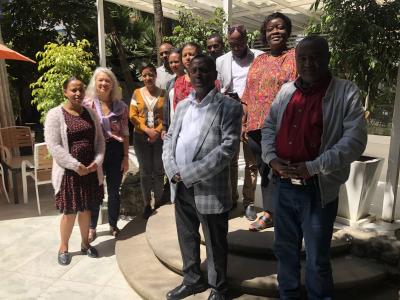
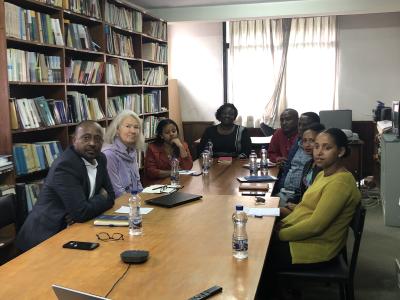
Climate change and contemporary migration, DIIS Event, 14 September 2023
This seminar focuses on the ways structural roots, such as inequality, as well as sudden events like natural catastrophes or conflicts enable and constrain current international migration flows. Furthermore, it highlights the importance of theory and categorisation in how we understand climate change and migration. Watch the livestreaming from the event.
Conference presentation
June 22-23, 2023 Dr. Aklilu Amsalu, Addis Ababa University and DIIS senior researcher Ninna Nyberg Sørensen presented PATHWAYS at the International Conference ‘Migration and Societal Change’, hosted by Utrecht University. They both participated in the panel ‘Staying as Adaptation Despite Climate Risk’ that focused on why, in the face of severe climate change, some chose to stay while others don’t. Based on research findings from Bangladesh, The Sudano-Sahel, small island developing States, Ethiopia and other places, panelists identified a need to move beyond the paradigm of the climate refugee or climate migration and include people’s efforts to remain in place in ongoing and future migration studies.
Establishing joint risk perceptions and security principles
From March 11th-13th, all members of the project, including the PhD students, participated in a specially designed Hostile Environment Awareness Training course (HEAT) in Addis Ababa. The course objective was to prepare the team for high-risk stress through classroom teaching and realistic simulations. Throughout the training, we developed shared guidelines for conducting pre-departure risk assessments, ensuring travel and accommodation safety, protecting interlocutors (including secure digital data storage), and providing debriefing and peer support. The HEAT course established a common understanding of field security within the group through the infinitely insightful presence of local researchers.
Inception workshop
In mid-March 2023 (8th-10th), a 3-day inception workshop took place in Addis Ababa. It laid the groundwork for the next four years and brought together the entire research team to discuss new mobility dynamics, key project objectives, child and youth-sensitive methodology, and future outputs related to work packages. The team jointly decided on the future field sites of (1) Wollo, Amhara; (2) Wolaita, Southern; and (3) The Rift Valley area of Oromiya.
Han har fulgt dem hele vejen: Intet menneske er den samme efter flugten til Europa
Kirsten Larsens interview med Tekalign Mengiste Ayalew, leder af PATHWAYS teamet i Etiopien, om den lange rejse fra Etiopien til Europa, Artikel på globalnyt.dk, 1. juli 2023
PATHWAYS shares research assumptions on ‘Folkemødet’
Climate change, migration and conflict have long been addressed in terms of crisis without critically addressing the political dimension of why and how interlinkages between these phenomena are framed as crisis and with what effects. At Folkemødet’s International Arena, Ninna Nyberg Sørensen drew on PATHWAYS pilot-study findings to identify several important policy dilemmas.
Den kyniske menneskesmugler er en sjælden art
Kirsten Larsens interview og podcast med Ninna Nyberg Sørensen, leder af PATHWAYS teamet i Europa, om menneskehandel og smugling fra Etiopien til Mellemøsten, Artikel og podcast på globalnyt, 3. marts 2023
Children and youth are particularly vulnerable to climate change impacts - Listening to their experiences may hold part of the solution, DIIS Report, 2021
Tekalign Ayalew Mengiste & Ninna Nyberg Sørensen
Climate change vulnerability and mobility among children and youth in Ethiopia - An annotated bibliography, DIIS Report, 2021
Ninna Nyberg Sørensen & Tekalign Ayalew Mengiste
Contact
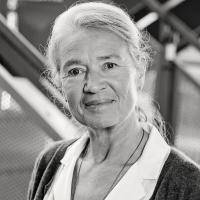
Research and activites
-
 Photo/illustration by Pixabay copyright licenseDIIS Comment2023Short-sighted policies are no remedy for climate-related migrationCecilia Menjivar & Ninna Nyberg Sørensen
Photo/illustration by Pixabay copyright licenseDIIS Comment2023Short-sighted policies are no remedy for climate-related migrationCecilia Menjivar & Ninna Nyberg Sørensen

